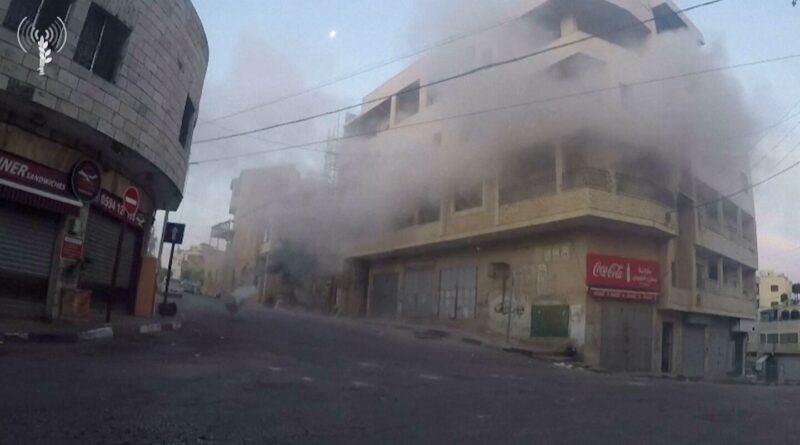Israeli Soldiers Demolish Palestinian Home, Fueling Clashes and Controversy
RAMALLAH, West Bank — On Thursday, Israeli soldiers destroyed the family home of Eslam Froukh, a Palestinian man accused of carrying out two deadly bus stop bombings in Jerusalem last year. The demolition sparked clashes between Palestinians and Israeli soldiers in the normally tranquil neighborhood of downtown Ramallah. Disturbing footage shared on social media captured Palestinians hurling explosives at Israeli armored vehicles, children affected by tear gas, and a prominent Palestinian journalist being injured by a rubber bullet to the head.
According to Israeli rights group B’Tselem, Israel has demolished 27 homes of suspected and convicted terrorists since the beginning of 2022, including 10 this year alone. If the trend continues, it would mark the highest number of demolitions since 2016, during the “knife intifada” when Palestinians carried out deadly attacks using unconventional weapons such as knives and vehicles.
Israel defends these home demolitions as part of a broader deterrence strategy, especially as terrorist attacks have been on the rise. Over the past year and a half, Palestinians have killed at least 48 people in Israel and the West Bank. However, some security experts argue that this approach is counterproductive, perpetuating the cycle of violence rather than containing it. Human rights advocates condemn the practice as collective punishment and a violation of international law. Froukh’s relatives believe that the destruction of their home was an act of revenge.
Froukh’s mother, known as Umm Eslam, dismissed Israeli police claims that her son was motivated by Islamic extremism. She maintained that her 26-year-old son, a mechanical engineer with a degree from a Jerusalem college, was wrongly framed for the attack. Israeli police had alleged that Froukh acted alone and had stockpiled explosives and a submachine gun in preparation for future attacks.
Umm Eslam expressed her belief that the demolition served only one purpose: revenge. In the aftermath of the destruction, her second-floor apartment lay in ruins. The site has since become a gathering place for well-wishers, leaving handprints, slogans of solidarity, and signatures from newly formed groups vowing to take up arms against Israel.
For decades, Israel has demolished the family homes of Palestinians accused of terrorism, intermittently correlated with waves of violence. Qadura Fares, president of the Palestinian Prisoners Society in Ramallah, describes it as an ongoing “war of attrition.” Israel seeks to increase the cost of Palestinian resistance to the occupation, hoping it will pressure Palestinians into making peace. However, Fares argues that home demolitions have only incited anger among Palestinians and provided an opportunity for armed groups like Hamas and Islamic Jihad to offer support and gain political favor by aiding families who have lost their homes.
While Israeli military officials claim that demolishing homes deters future attackers, the academic research on the topic is limited and inconclusive. A 2015 study during the wave of suicide bombings of the second intifada found that punitive house demolitions had a temporary negative impact on the number of suicide terrorists. However, a 2021 study from the same period showed that punitive demolitions had no real impact, while “precautionary” demolitions, targeting buildings that could be used for sniping, led Palestinians to adopt more radical political opinions.
Critics argue that Israel’s home demolitions are primarily driven by political demagoguery rather than counterterrorism. Former Israeli Supreme Court judge Menachem Mazuz stated that the tactic aims to appease public opinion, even though the leadership knows it will not prevent future acts of terror. The U.S. State Department has deemed the practice counterproductive to the cause of peace.
Initially considered “borderline legal” by an Israeli military commission in 2005, home demolitions were paused but later resumed after a 2008 Palestinian shooting. The condition was that the practice would be used only under extraordinary circumstances. However, as the conflict and occupation persisted, the measure became routine.
With Israel’s current far-right government pledging to expand and intensify home demolitions, critics fear that the practice is being implemented with even less discretion than before. Critics argue that deterrence is merely a facade, with political considerations taking precedence over security concerns. The Supreme Court, which has been divided on home demolitions, is now facing attacks from the government, potentially further limiting its ability to challenge problematic policies.
As violence escalates and right-wing politicians seek to fulfill promises of a “tough on terror” approach, security and legal experts worry that home demolitions are being carried out without due process. Palestinians like Bassem Halqa, who owns a convenience store beneath the demolished Froukh apartment in Ramallah, fear the consequences of punitive measures enacted by what they consider “war criminals” in power.




